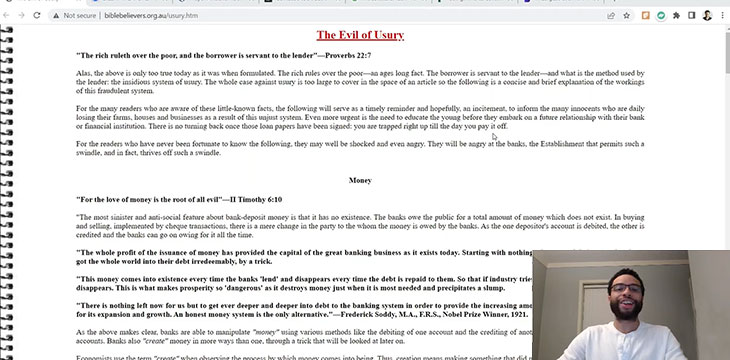|
Getting your Trinity Audio player ready...
|
A topic of great interest to many in the digital currency industry is how the debt-based money system works and how Bitcoin might change it. In a recent video, BSV developer Joshua Henslee talked about it at length.
Thoughts on the debt-based monetary system and debt in general
Henslee gives a high-level overview of the Federal Reserve, central banks, and how the debt-based money system works. He explains how for most people, this system is somewhat like indentured servitude; most people accumulate debt and work a lifetime to pay it off with interest. He emphasizes that he’s not saying debt is wrong but is simply stating the fact that this system leads most people to a life of paying off debt, which he likens to future claims on their time.
Henslee looks at a few famous quotes about central banking, including “let me issue and control a nation’s money, and I care not who makes its laws,” by Mayer Amschel Rothschild. In his view, Rothschild knew that central banks could do whatever they wanted, including inflating the money supply, and that the majority of the public would remain oblivious. That said, he says he has noticed that more people are waking up and becoming aware of this system. For example, he hears lots of everyday people talking about inflation. People are becoming aware of how this system works.
Digging deeper, Henslee notes how most people who take loans don’t factor in inflation. The interest is one element of the loan repayment, but the dollars people earn are also being constantly devalued, making it more challenging to repay the debt in many cases. Satoshi Nakamoto himself talked about how central banks have historically debased fiat currencies through inflation in his first public post about Bitcoin.
Greed in both systems and the multiple sides of debt
The few who could understand the system will either be so interested in its profits or so dependent on its favors that there will be no opposition from that class, while on the other hand, the great body of people, mentally incapable of comprehending the tremendous advantage that capital derives from the system, will bear its burdens without complaint, and perhaps without even suspecting that the system is inimical to their interests. – Mayer Amschel Rothschild
While this quote explains how our current financial system works, Henslee notes that it applies perfectly to the current situation in so-called ‘crypto.’ Those who understand how the system works (essentially like a pyramid scheme) are so intoxicated by the wealth and profits it has brought them that they won’t put up a fight. At the same time, the masses remain ignorant, buying various coins in the hope of a little financial relief or easy riches.
Henslee detours briefly into how banking is supposed to work. Banks are supposed to lend money to value creators (entrepreneurs) at higher interest rates than they pay depositors. However, they haven’t been able to resist the urge to take on greater risk, operating on a fractional reserve system in the quest for greater profits. Again, Henslee notes that this is how many digital currency industry operations work. They’ve even created their own money printer (Tether) to fuel their greedy ambitions. It’s also the mindset of many speculators in the space; double-digit annual returns aren’t good enough—they want 100x pumps on their coins quickly.
Wrapping up this section, Henslee notes that non-participation in these systems is the third option. While debt can be used to enslave oneself, and it can also be used to make money by those who know how to harness it to buy assets, one can also opt-out of the debt-based system and set oneself free.
Bitcoin was supposed to be cash
Henslee opens this segment by noting that the title of the Bitcoin white paper states clearly that it’s a peer-to-peer electronic cash system. “Cash is an asset,” he reminds us.
However, neither Bitcoin nor other digital currencies behave anything like cash today. Henslee looks at how Coinbase recently used BTC as collateral to take out a loan from Goldman Sachs. He finds this pathetic, given that Bitcoin was supposed to compete with the fiat money system.
“It’s come full circle,” he says, clearly exasperated by the situation.
In Henslee’s mind, this sort of thing is happening because BTC has failed as cash and also because there’s no real liquidity in the markets. Borrowing real dollars against Bitcoin is one way to extract money out of the system, and this could be the new tactic used by those who seek fiat currency in exchange for essentially worthless tokens. He notes how if BTC was spendable as money, there would be no need to do this. The other possibility, he speculates, is that Coinbase (NASDAQ: COIN) is strapped for cash, which is worrying in and of itself.
In closing, Henslee circles back to the Mayer Amschel Rothschild quote above. “Folks are just caving to the old system,” he says, noting how Coinbase, a company supposed to challenge the banks and the financial system, is now doing business with one of the key architects of the 2008 financial crisis. This is hypocritical, given how BTC maximalists often talk about how Bitcoin was created as a solution to that crisis.
Luckily, Bitcoin is alive and well in the form of Bitcoin SV, so there’s still hope for change.
Don’t miss out the first ever BSV Global Blockchain Convention taking place at the Grand Hyatt in Dubai on May 24 – 26. Book your tickets today!

 03-01-2026
03-01-2026 




